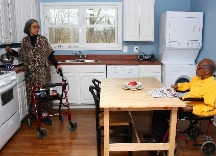In November 2020, Port Of Harlem celebrated 25 years of publication. As we count down to our birthday, we will republish some of our most popular articles from our print issues. Thanks for subscribing and inviting others to join you in supporting our inclusive, diverse, pan-African publication - - now completely online. We originally published this article in the May - Oct 2010 print issue.
They call them snowbirds, retired people who live in the North during the summer and choose to live in the warmer South during the winter. Developers even build communities to meet their needs. However, the majority of American seniors live in naturally occurring retirement communities (NORC), which are areas not originally built for older adults, but now contain a significant elder population.
“For many African American elders who have experienced years of economic disadvantages and social inequities aging in place leaves them with limited choices,” says LaNita Garmany, Project Director for the Communities for Life in Indianapolis. Stephanie Pender, Executive Director of New York’s Lincoln Square Neighborhood Center, reveals that 88 percent of the elders in her NORC are African American or Latino. Of this group, 63 percent live at less than 200 percent of the poverty level, 76 percent have less than a high school education, and only 30 percent have primary care physicians.
To meet the needs of a booming aging population who live in NORCs, the U.S. Administration on Aging is funding programs in eight states including Indiana and New York. The program’s goal is to assist elders to age in their homes by providing health and social services within their neighborhood. “It’s less expensive to have a person age at home rather than in a nursing home or even assisted living,” explained Terri Martin, the Gary, Indiana Midtown NORC Project Director.
The services NORCs provide vary. The Gary program provides referrals for senior adult foster care, and conducts neighborhood cleanup activities for beautification and safety reasons. They also provide home improvements such as installing and repairing steps and handrails to prevent falls, and installing smoke and carbon monoxide detectors to warn seniors of possible dangers. The program even provides initial funds for Life Alert services with the hope that family members will see the value and continue the payments.
Aging in Place

Like many across the country, the Gary participants have worked all their lives. Martin adds, “Many of our clients have earned steel mill pensions, but the pensions do not meet all their needs and many don't qualify for other assistance.” Nevertheless, Martin asserts that they have earned the program’s support. “They pay taxes and are usually the group holding troubled neighborhoods together,” she says. She admits that it would be unnecessary for her to provide some of the services if the local government would enforce its own laws.
According to an Indiana University, 94 percent of those 60 and older want to remain in their current residence for as long as possible, so Martin has to choose her fights with stubborn seniors and their families about life’s issues. One Gary senior who is aging in place is Martha Naylor. After getting her renewed driving license, the101-year-old said, “I have been here so long, the house is paid for, and it is cheaper for me live here than in a facility where many of my friends are not terribly happy with the services.”
Minietta Nelson who is retired, but works with the Gary program, says children should not ignore their parent’s needs. “The government has a role in providing seniors a safe and supportive environment, but children have responsibilities, too.” She continued, “As I tell my own children who have moved away, ‘I want to stay in my own home, but at least call me to see how I am doing.’”
According to an Indiana University, 94 percent of those 60 and older want to remain in their current residence for as long as possible, so Martin has to choose her fights with stubborn seniors and their families about life’s issues. One Gary senior who is aging in place is Martha Naylor. After getting her renewed driving license, the101-year-old said, “I have been here so long, the house is paid for, and it is cheaper for me live here than in a facility where many of my friends are not terribly happy with the services.”
Minietta Nelson who is retired, but works with the Gary program, says children should not ignore their parent’s needs. “The government has a role in providing seniors a safe and supportive environment, but children have responsibilities, too.” She continued, “As I tell my own children who have moved away, ‘I want to stay in my own home, but at least call me to see how I am doing.’”
Martin’s Tips: 5 Things Children Can Do For Elder Parents
- Estate planning
- Seek long term care insurance/Medicaid eligibility
- Know a parent’s medical history and medications
- Maintain constant contact and well-being checks
- Assist with home maintenance
Advertisers | Contact Us | Events | Links | Media Kit | Our Company | Payments Pier
Press Room | Print Cover Stories Archives | Electronic Issues and Talk Radio Archives | Writer's Guidelines






